What You Can Do
What You Can Do About Trash Pollution in Your Waterways
Anyone, from a student to a CEO, can prevent trash from ending up in our oceans. There are actions you can take at home and in your community to protect our water.
Reducing Trash at the Consumer Level
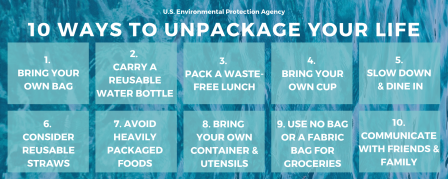 The number one way to prevent trash pollution from ending up in our waterways is to reduce the amount of trash that is created in the first place.
The number one way to prevent trash pollution from ending up in our waterways is to reduce the amount of trash that is created in the first place.
Find ways to unpackage your life with the 10 tips shown on this page. You can also read about them on our Unpackage Your Life page.
- shopping for second-hand clothing and home items,
- investing in quality, long lasting-products you can reuse, and
- repairing things when they break.
Proper Trash Disposal
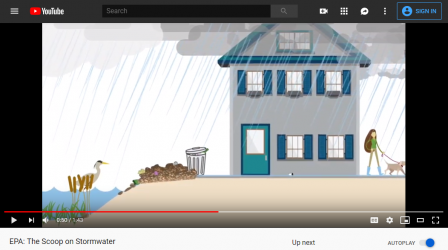 Get the scoop on stormwater in this video, which discusses green infrastructure and other resilient, cost-effective approaches to managing wet weather impacts.Marine litter is often the result of poorly-managed trash on land. If not disposed of properly, your trash can end up in waterways and flow downstream into the oceans. In fact, 80% of the marine litter found on coastlines during cleanups and surveys originated from land-based sources.
Get the scoop on stormwater in this video, which discusses green infrastructure and other resilient, cost-effective approaches to managing wet weather impacts.Marine litter is often the result of poorly-managed trash on land. If not disposed of properly, your trash can end up in waterways and flow downstream into the oceans. In fact, 80% of the marine litter found on coastlines during cleanups and surveys originated from land-based sources.
-
Research what materials are recycleable in your area and follow that guidance when you dispose of trash.
-
Put recycling and trash in the appropriate bins, not next to them or on top of an overflowing bin. Leaving materials outside of bins increases risks to sanitation workers, can attract pests, and contributes to litter.
-
Make sure your trash bins are covered and secured at night and during storms.
-
Don’t put your recyclables in plastic bags.
NEW!: Looking for tips and reminders on waste management during and after COVID-19?
-
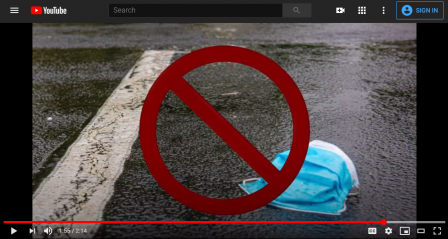 Video message from Administrator Wheeler: The Importance of Recycling and Proper Management of PPE During COVID-19.Properly dispose of your Personal Protective Equipment (PPE). Remember to throw your masks, wipes, and latex gloves in the trash and not in the street, parking lot, or sidewalk.Exit
Video message from Administrator Wheeler: The Importance of Recycling and Proper Management of PPE During COVID-19.Properly dispose of your Personal Protective Equipment (PPE). Remember to throw your masks, wipes, and latex gloves in the trash and not in the street, parking lot, or sidewalk.Exit -
Keep Personal Protective Equipment out of the recycling bin.
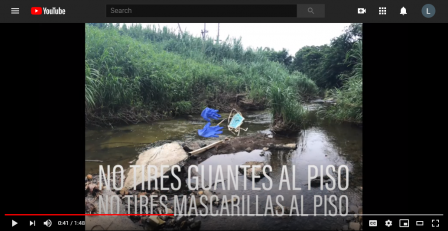 View a video produced by the San Juan National Estuary Program in Puerto Rico regarding proper disposal techniques for Personal Protective Equipment during COVID-19. (En Español)
View a video produced by the San Juan National Estuary Program in Puerto Rico regarding proper disposal techniques for Personal Protective Equipment during COVID-19. (En Español) -
During this time, many of us are home for longer periods of time. You may notice you are generating more material than normal. Be sure to recycle more, recycle right.
-
If someone in your home has COVID-19, treat your recyclables as trash.
-
Spring cleaning? Consider setting aside items to donate, recycle, or dispose of later when it's safe to bring them to a drop off location or collection event. Follow local guidelines - many localities are limiting service at this time (e.g., not picking up bulk items).
Cleanups and Community Engagement
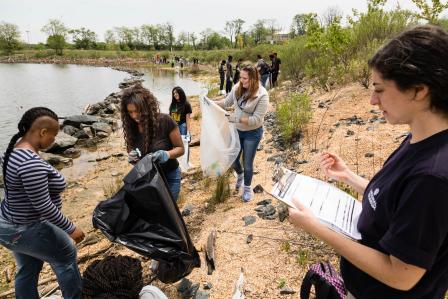 Students participated in a litter audit in Masonville Cove, MD to remove trash from the environment and to collect data on the types of litter they found. Will Parson, 2017.Getting engaged in your community and taking an active role in cleaning up your neighborhood can have a large influence on the amount of trash that reaches our water. Invite your friends, family, and classmates to join in!
Students participated in a litter audit in Masonville Cove, MD to remove trash from the environment and to collect data on the types of litter they found. Will Parson, 2017.Getting engaged in your community and taking an active role in cleaning up your neighborhood can have a large influence on the amount of trash that reaches our water. Invite your friends, family, and classmates to join in!
-
Collect data on what you find!
-
Organize a class presentation for America Recycles Day.
-
Use the Marine Debris Campus Toolkit to bring positive change to your university.
Education Leads to Action
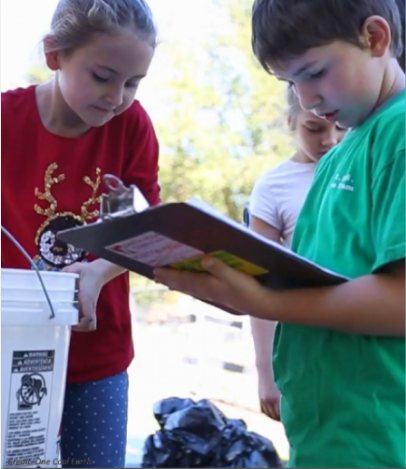 Students involved in their school's waste reduction program which includes a large marine litter education component. One Cool Earth (NOAA), 2017. Understanding how trash enters our waterways and impacts our communities, economies, and natural ecosystems is an easy step on the path to tackling the trash pollution problem.
Students involved in their school's waste reduction program which includes a large marine litter education component. One Cool Earth (NOAA), 2017. Understanding how trash enters our waterways and impacts our communities, economies, and natural ecosystems is an easy step on the path to tackling the trash pollution problem.
-
Read the Trash-Free Waters newsletter or watch our webinar series to stay up to date with recent trash capture projects and research efforts. Share what you learn with your peers!
